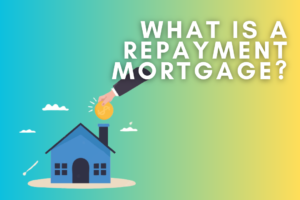When looking for a new mortgage you might notice INTEREST ONLY or REPAYMENT.
Lets look at the pros and cons of both types of loan to help you decide which is best for you.
Interest only initially appear to cost less. However, they generally come with higher fees for setup. Furthermore, you must have a plan to repay the debt when the mortgage ends.
On the other hand, repayment mortgages will have higher monthly payments but lower costs by the time you finish the loan. At the end of the mortgage term those on repayment will have cleared the full debt they owe.
What Is A Repayment Mortgage?
 A repayment mortgage is a type of home loan which your monthly payments are broken into two parts.
A repayment mortgage is a type of home loan which your monthly payments are broken into two parts.
One portion will pay the interest accrued on the money borrowed, while the other part contributes to decreasing the loan principal.
The monthly payment on a repayment mortgage is designed to ensure the full amount borrowed is paid off by the end of the mortgage term. Typically a repayment mortgage term will be around 25 years but can be as high as 40 years.
Once you have completed a repayment mortgage you will possess the full ownership of the property.
Check 👉 Property refinancing for beginners.
How Do Repayment Mortgages Work?
Every month you make a payment towards your repayment mortgage, your balance will gradually decrease with each monthly payment.
Interest is front loaded, so in the early years a larger portion of your payment will be directed to the interest rather than debt reduction.
As you get further through your mortgage, the interest owed decreases inline with the shrinking loan balance. This leads to a larger portion of your monthly payment being applied to the mortgage debt.
If you have extra funds you can make extra payments on your mortgage which will reduce your balance faster and save you interest. Most lenders allow you to overpay your mortgage by around 10% a year.
From time to time you can decrease the cost of your monthly repayment by switching to a plan with a lower interest rate.
What Is An Interest Only Mortgage?
With interest only mortgage, your monthly payments solely cover the interest on your mortgage.
Consequently, your monthly expenses are lower, but the outstanding debt owed to your lender remains unchanged.
If you borrow £200,000, you will need to get £200,000 to pay off the loan by the end of the mortgage term, typically around 25 years. Alternatively you could take a new loan with a new lender and go again.
Most lenders currently demand proof of a repayment strategy and a sizeable deposit before considering an applicant for an interest-only deal.
Most Interest Only deals are used for Buy To Lets and normally you need to put down a 25% deposit.
How Do Interest Only Mortgages work?
Interest only loans have monthly payments that only pay the interest each month, this makes them less expensive than repayment loans of the same amount.
On a 25-year, £200,000 loan with a 3% interest rate, interest only payments would be around £500, as opposed to nearly £950 for a repayment loan.
Unless you intend to sell the property upon completing the mortgage term, the goal is to save or invest the difference in a repayment plan, ensuring you have the funds to pay off the initial loan amount.
However, not everyone successfully achieves this, so your lender may want to periodically assess the progress of your repayment plan throughout the mortgage term.
The easier way to deal with the debt at the end of the term is to contact your mortgage broker and get a new deal.
What Happens When Your Interest Only Mortgage Ends?
When your term ends on your interest only loan you need to settle the initial amount in a single payment.
Options to clear the debt.
- Use your personal savings to pay off the amount.
- Sell stocks and shares you have to clear the balance.
- Cash in a pension.
- Sell the property and use the equity to pay the debt.
- Get another mortgage either repayment or interest only (MOST Common)
Advantages & Disadvantages Of Repayment Mortgages
Repayment loans come with their own set of pros and cons.
Advantages:
- You own the property once you complete the payments.
- Interest reduces as you progress through the loan.
- As your loan shrinks you get access to better deals.
Disadvantages:
- Higher monthly payments compared to Interest Only
- Debt reduces slowly in the early years.
Advantages & Disadvantages of Interest Only Mortgages
So lets look at the pros and cons of Interest Only.
Advantages:
- Lower monthly payments giving you more cashflow from rent.
- More profit each month.
- Extra cash in your pocket to use on other investments.
Disadvantages
- Full payment required at the end of the loan.
- You will pay more interest due to loan amount not reducing.
- Risk of loss if your property loses value.
Which Loan Type Is Most Suitable For Me?
 If you are borrowing to buy a property for you to live in then repayment is usually the best way to go. Your balance will reduce over time meaning you will have no payments due when you retire.
If you are borrowing to buy a property for you to live in then repayment is usually the best way to go. Your balance will reduce over time meaning you will have no payments due when you retire.
Most lenders will only lend interest only on a residential property when the deposit is above 50% of the money they wish to borrow.
Interest Only is more common with Buy To Let investing, property owners improve their cashflow from rent by keeping payments low.
If you can qualify for a residential interest only loan, this will help you reduce your payments on a short term basis. You can in the future switch to a repayment mortgage to start paying down the balance you owe.
What If You Want To Switch To An Interest Only Or Repayment Mortgage
Its possible to switch from Interest Only to Repayment and vice versa.
Yes its pretty straightforward, often people switch to Interest Only when they are having financial difficulty. You will need to prove to the lender you can afford the new payments, which if reducing the payment is pretty easy to do.
I don’t like to pay off my mortgages check out this blog on why.


